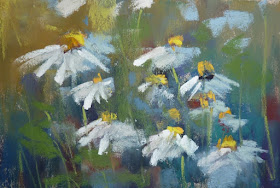 |
| 'Daisies' 4x6 pastel ©Karen Margulis |
Keep those great questions coming! The next few days will be devoted to my tests on the new Uart Dark sanded paper. Your questions are helping me put the paper to the test! Before we explore dark paper any further let's address the question of why would we want to work on dark paper in the first place! There are many reasons artists like black or dark toned paper but my favorite reasons are VIBRANCY and CONTRAST.
 |
| My pastel palette on a black cloth. Look at how vibrant they look! |
- VIBRANCY. Look at how bright and intense the pastels in the above photo appear on a black surface. This same level of vibrancy can be achieved on a black or dark surface. Pastels glow and come to life on a dark surface. Because the paper is black or dark....the lights and brights appear even lighter and brighter than they would on a lighter surface. (simultaneous contrast at work)
- TIP: When choosing a subject to paint on black choose something that will exploit the ability of the dark paper to make light and bright colors pop. Subjects such as flowers are wonderful candidates for black paper.
- CONTRAST: Black or dark paper can lead to stronger paintings. The dark tone provides the glue that holds everything together. It provides the much needed contrast with the middle and light values. If handled well the back paper can help unify shapes and prevent spottiness. I like to block in a painting with simple shapes of 2-4 values. These big areas of light and dark form the foundation for the detail and colors to follow. Working on a dark paper ensures that my darks are strong enough. (often we are afraid of pushing the darks too far and we end up with disjointed and weak paintings)
- TIP: The Uart dark paper is dark but there are some pastels, notably the Terry Ludwig eggplant which is actually darker than the paper. I like to use these 'super darks' with restraint as accents. This makes the dark paper a perfect overall dark allowing my accents to pop!
The photos below show the progression of today's painting. I have repeated the same painting with the same pastels on each grade of Uart Dark. I will share the results in tomorrow's post.
 |
| Blocking in the darks and starting some mid value green |
 |
Adding the bright yellow centers and the darkest accents.
See how they pop on the black paper! |
 |
| Adding the lights using a pale blues |
 |
| Painting a simple background of greens allowing the paper tone to peek through |
 |
| Adding some warmer lights on the petals and a few details. |
 |
| Finished painting on Uart Dark 500 |
As an experiment I painted the same daisies using the same pastel palette on regular sand color Uart. Can you see a difference? Did the black paper change the look of the painting?
 |
| Painting on regular Uart 500 sand color |











Trying to keep pure spots of black showing in the painting takes a lot of planning and seems to make me less fluid and free while painting. How do you suggest I plan for that? Thank you, Karen.
ReplyDeleteThanks for commenting! I find I have the best success with letting any underpainting or toned paper show is to work with a light touch. If I build my layers delicately I have a better chance of not covering all the good bits!
ReplyDelete